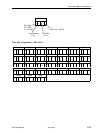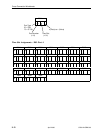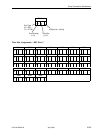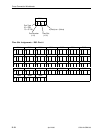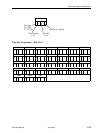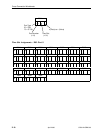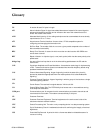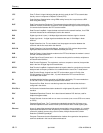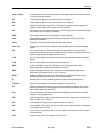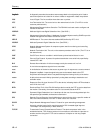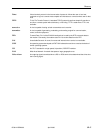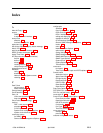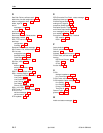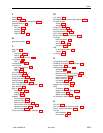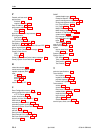
Glossary
GL-3
8700-A2-GB20-00
April 2000
A predetermined set of configuration options containing the optimum settings for operation
on asynchronous dial networks.
Frame Alignment Signal. A loss of frame (LOF) error detection.
Frame Alignment Word. A loss of synchronization error detection.
Federal Communications Commission. The Board of Commissioners that regulates all
electrical communications that originate in the United States.
Facility Data Link. The selected framing bits in the ESF format used in a wide-area link that
are used for control, monitoring, and testing.
Far-End Block Error. Block errors reported by remote equipment.
One identifiable group of data bits that includes a sequence of bits for control and
identification information.
A program or device that assembles and disassembles frames.
A high-speed connection-oriented packet switching WAN protocol using variable-length
frames.
File Transfer Protocol. A TCP/IP standard protocol that allows a user on one host to
access and transfer files to and from another host over a network, provided that the client
supplies a login identifier and password to the server.
An ITU recommendation for the physical and logical characteristics of hierarchical digital
devices.
An ITU recommendation for synchronous frame structures.
High Density Bipolar Three Zeros Substitution. A line coding technique used to
accommodate the ones density requirements of E1 lines.
High-bit-rate Digital Subscriber Line. A technique for high bandwidth, bidirectional
transmission over copper wire for T1 and E1 services.
High-bit-rate Digital Subscriber Line, 2nd generation. An ANSI specification for high
bandwidth, bidirectional transmission over a single twisted pair.
Internet Protocol. An open networking protocol used for internet packet delivery.
Internet Protocol address. The address assigned to an internet host.
International Telecommunications Union. The telecommunications agency of the United
Nations, established to provide standardized communications procedures and practices.
Before March 1993 it was called CCITT.
Local Area Network. A privately owned and administered data communications network
limited to a small geographic area.
Light Emitting Diode. A light or status indicator that glows in response to the presence of a
certain condition (e.g., an alarm).
Line Interface Unit. A physical layer data transmitter and receiver.
Line LoopBack. A test in which the received signal on the network interface is looped back
to the network without change.
Loss of Frame. Occurs when a DS1 terminal is unable to synchronize on the DS1 signal
for some interval.
Loss Of Frame Count. The number of LOFs declared.
factory defaults
FAS
FAW
FCC
FDL
FEBE
frame
framer
frame relay
FTP
G.703
G.704
HDB3
HDSL
HDSL2
IP
IP address
ITU
LAN
LED
LIU
LLB
LOF
LOFC



